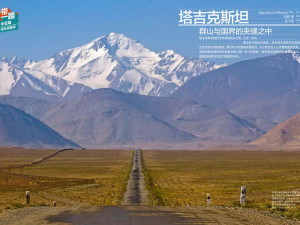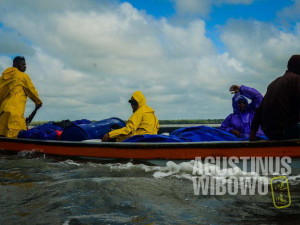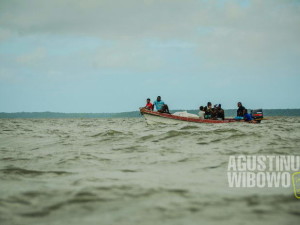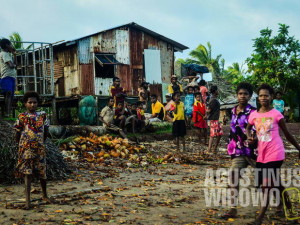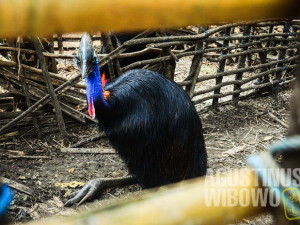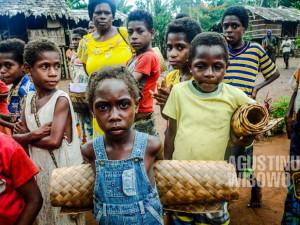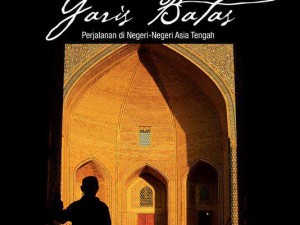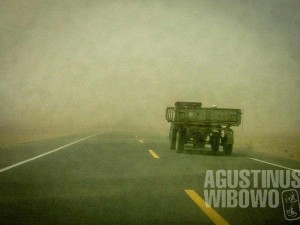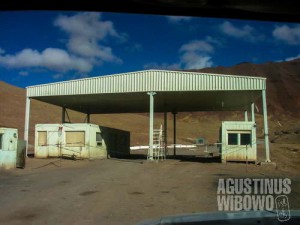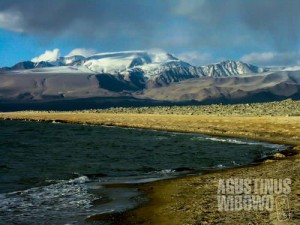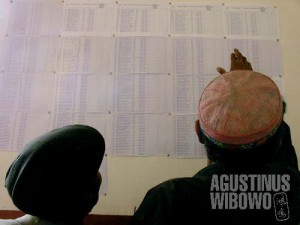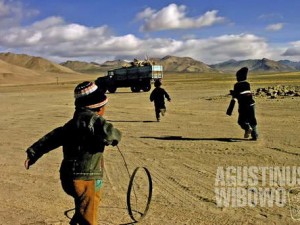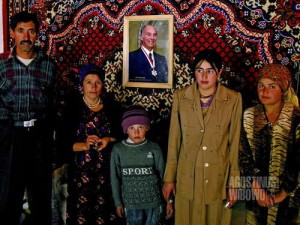border
My article in Chinese National Geography, edition October 2015. This is a special edition focusing on China’s grand project: One Belt One Road, a.k.a. the “New Silk Road”, with some focus articles from the Silk Road countries, especially in Central Asia. In this edition, I have contributed two articles: Tajikistan and Afghanistan’s Wakhan Corridor. 塔 吉克斯坦被称作中亚的高山之国,它近一半的国土位于帕米尔高原。其实塔吉克族并非是自古生活在山地的民族,面对如今的国家版图状况,不少塔吉克人心中有难 言的苦衷。来自印度尼西亚的作者奥古斯汀是一名“中亚通”,他对塔吉克斯坦的考察和采访,能够加深我们对这个国家的认识。 撰文Agustinus Wibowo[印尼] 摄影刘辉 等 翻译王飞宇 令塔吉克人自豪的两座古城,如今却位于乌兹别克斯坦的境内 [read more]
Marukara 4 September 2014: A Dangerous Adventure with Indonesian Illegal Traders (2)
We were traveling in the southern coast of Papua New Guinea with a group of illegal buyers from Indonesia. As the buyers were fearing the assault from local criminals or being caught by PNG police patrol, we decided to stay overnight in the wilderness. The most sensible place for tonight was Marukara, an empty small island across the village of Mabudauan. But unfortunately, when we arrived in the darkness of night, we found that the island was anything but empty. There were many boats parked on the shore. Men were shouting at us. We recognized that they were shouting in Kiwai language, which nobody in our group understood. Sisi shout back in English, “We are not enemy, we are from Tais. Are you guys from Mabudauan? In the past, our ancestors also caught fish in this area. Our ancestors also worked together with your ancestors.” The men shouted back. “Yes! We are from Mabudauan. Welcome!” Suddenly from the island came out a dozen of young men, directing our boats to avoid the [read more]
Marukara 3 September 2014: A Dangerous Adventure with Indonesian Illegal Traders
The coastal region in the southern Papua New Guinea near the Indonesian border is notorious for the illegal cross-border trading activity. Indonesian traders often cross the sea border from Merauke in the west and venture to Papua New Guinean villages to do their unlawful business. This is a very dangerous journey, due to attacks from the pirates and possibility being caught by joint PNG—Australian border patrol. I could sense the over-cautious attitude in Herman—a Marind trader from Merauke, whom I saw one boat of three passengers floating on the sea near the Buzi village. Marind is a Papuan native tribe inhabiting Merauke, a big city and its surrounding regions at the Indonesian side of the border. Thus, as a dark-skinned and curly-haired Melanesian, Herman did not look any different from the PNG villagers in this area. It was Sisi who disclosed Herman’s Indonesian identity to me. Herman’s boat was heading from west to east, making a short stop in Buzi as he was to meet [read more]
Buzi 2 September 2014: Not As Paradise As It Seems
Being in such isolated place like Tais, I was totally at the mercy of my host. I could go nowhere without approval from Sisi the Tais woman who brought me here. I had been staying in Tais for more than a week. I wanted to see more places. I wanted to go to Mari, the neighboring village four hours away by walking where Sisi used to live. But she did not allow me, saying that people there would kill me. I wanted our group to depart earlier to Daru, so we could stop in Buzi or Sigabadaru, border villages face to face with Australian islands of Boigu and Saibai. Sisi also did not allow me, saying that the villages were full of raskol (rascals). “But Sisi, how can be raskol there? These are just little villages, everybody knows everybody,” protested me. “No, no. You markai are just foreigner, you never understand,” said Sisi, “These people are jealous people. They will kill you.” Tais, she said, was different from other villages nearby. Tais is so small, the people have [read more]
Tais 30 August 2014: A Nation in Waiting
Nobody would deny, Tais is a very blessed land. See how green the vast pasture surrounding the village—even though your economist mind may ask why such a potential fertile land is just wasted and overgrown by wild grass as tall as your chest. See how bountiful their garden products are, their huge yams and blue yams and cassavas and sweet potatos, their super-sweet bananas and super-hot chili and super-fresh coconuts and super-big oranges. When the men go hunting to nearby jungles, they almost never come home empty handed. The people of Tais never ran out of food, as their land provide much more than enough for its 80 families spread in the 1 kilometer breadth of their village. Despite of this, you would see the children were very unhealthy; they have skinny bodies of bones but with big bellies. I asked Sisi—my host in this village—why. She just laughed, and said that it was children loved to eat too much. But I thought it was due to their monotony of diet, most of which was [read more]
Tais 28 August 2014: What is Your Dream?
The school is supposed to start at eight in the morning, and to finish at twelve. But none in this Papua New Guinean coastal village have clocks. Including Madam Singai, the only school teacher in the village. Nevertheless, she knows perfectly when she should start her class. That is when she has finished the cassava cooking and baby feeding in her house, and when she believes the sun is high enough. She then roams around the village, shouting all her students’ names. Dozens of barefooted students then resemble a parade of obedient ducks, follow her to the school hut at the end of the village. Madam Singai also knows when to finish her school. That is when most of her students make so much of noise, crying because of being hungry, or because of her own stomach produces noise calling for lunch. After gathering the students, Madam Singai is ready for the class today. The classroom for the Grade I and II students. Centipedes disrupted the class. Of course once in a while Madam Singai [read more]
Garis Batas – Perjalanan di Negeri-Negeri Asia Tengah (Borderlines)
My second published travel writing book, on journey to Central Asian countries (The “Stans”). Indonesian language. Borderlines – Journey to the Central Asian States Everyday, Afghan villagers stare to “a foreign country” which is just a river away. They look at passing cars, without even once experiencing sitting inside the vehicles. They look at Russian-style villas, while they live in dark mud and stone houses. They look at girls in tight jeans, while their own women are illiterate and have no freedom to travel. The country across the river seems magnificent—a magnificent fantasy. The same fantasy brings Agustinus Wibowo travel to the mysterious Central Asian states. Tajikistan. Kyrgyzstan. Kazakhstan. Uzbekistan. Turkmenistan. The “Stan brothers”. This journey will not only bring you step on snowy mountains, walk accross borderless steppes, adsorbing the greatness of traditions and the glowing Silk Road civilization, or having [read more]
Mashhad – The Empty Border
The dusty border Two years ago, when I came to Iran for the first time through the Islam Qala border, I was astonished by the scene of hundreds of wild Afghan men fighting to pass the border line, to quit their homeland and reach hope in rich Iran. But now, it’s not anymore the scene. The Afghan-Iranian border in Islam Qala is quite empty. Iran has tightened up the visa approval for Afghans. Land crossing is no more permitted for ordinary Afghans. The Iranian visa from Kabul is mostly stamped “For Air Travel Only”, putting them to obtain roundtrip ticket only with Iranian airlines. In some cases, visa applicants need to spend at least 1000 dollars just to get the entry visa. Indeed, one’s passport determines his or her fate. I arrived in Afghan immigration hall after 100 meter walk. People are sitting idly to wait for the officers come back from their lunch break. There are three officers behind the table. One is examining the passports, one is stamping, and the last one is [read more]
Shakhimardan – An Uzbek Island Surrounded by Kyrgyz Mountains
Shakhimardan, an Uzbek “island” surrounded by Kyrgyzstan As artificial as any other thing in Central Asia was the border lines between the countries. The nations created by the Soviet rulers now had to be provided their homeland. Stalin might say, land populated by most Uzbek should be Uzbekistan, those inhabited by mostly Mongoloid Kyrgyz then became Kazakhstan (the Kazakh was called as Kyrgyz) and Kyrgyzstan (of which people was called as Black Kyrgyz). But the matter was not simple in the Ferghana Valley. Ferghana Valley was always a boiling pot in Central Asia. The people were renowned as deeply religious Muslim, if not fundamentalist. It was more than necessary for the Russian to divide this huge mass with the highest population density all over Central Asia. Then, besides the division of ethnics (who were Uzbek, who were Kyrgyz, and who were Tajik), there was a clever intrigue by dividing the border lands to divide the people. Then, the identity in Ferghana Valley [read more]
Turkmenabat – Good Bye Turkmenistan
The crowded train journey before the New Year The cheap train ticket price for the 15 hour journey to Turkmenabat (formerly Charjou) placed me in the hard seat wagon of the train. I already expected what the seats to be. As its name, hard seat, the seats were all concrete hard wooden. Just imagine if you have to sit on wooden chairs like in primary school classrooms for 15 hours. After surviving the journey my butt became as flat as the chairs. But that was indeed what you get with 15,000 Manat (60 cents), incredible price considering the distance. Now was close to Navruz, known here as well as Bayram (Festival). All people wanted to go home. The seats and sleepers in this train were all booked some days in advance. Many of the people couldn’t get tickets. The train officers allowed people without ticket to be boarded as well, in a limited quota, after all passengers with ticket boarded. It was a chaos. Those passengers without ticket fought hard to enter the train. None of them [read more]
Ashgabat – The Golden Man
“The 21th century is the Golden Age of the Turkmens” – A poster in Ashgabat “The Great Leader is Eternal” Mashhad bus terminal was as busy as the Southern Terminal (Terminal e Jonub) of Tehran. The closer the day to the Persian New Year (Nooruz in Iran, Navruz in Central Asia), the more difficult and expensive transport would be to come by. I was told that the bus ticket was already booked until the next 20 days. I was indeed lucky to get the yesterday’s ticket one day before departure, after struggling around Tehran’s various bus terminals. Nooruz might not be the best time to travel in Iran. The 15 hour bus journey to Mashhad cost 95,000 Rial, was still a good price for holiday season like this. I sat next to a Persian boy, Javad, from Zahedan who was living in Karaj as a student. His hometown, Zahedan, near the Pakistan border at the far south point of Iran, is home to the Balluchis. The Balluchi men wear shalwar kameez dress, just similar [read more]
Tashkent – Flying Home
The Uzbek Airways flight HY553 flight of Uzbek Airways left Tashkent airport at 11:30 exact heading to Kuala Lumpur. I was among the few passengers on that plane. Kuala Lumpur, compared to New Delhi, Lahore, and Bangkok, is a dry destination from this country in the central of Central Asia. This morning there were several flights to Asia, and all were full of passengers, but less than 20 people boarding from Tashkent to Kuala Lumpur. This morning started very messy. It seemed I was not prepared yet to leave Central Asia this sudden. The notorious Uzbekistan immigration officer was not that bad though. My embassy has prepared me with magic letter so that if they tried to find trouble I still have a way out. During my two month stay in the country, I had never registered myself to the OVIR office (Passport and Immigration office), thus my stay was illegal. Luckily the immigration officer was too happy to speak Tajik language with me, chatting about the luck of living in a Muslim country [read more]
Ferghana – Police Department Visit
The journey to Ferghana, passing through very high snowy passes. Ferghana valley might be the widest valley in the world. A huge area surrounded by great mountains, sliced into portions of three countries (Uzbekistan, Kyrgyzstan, and Tajikistan) by only-God-knows-how-it-works border lines. I am always interested in visiting Ferghana Valley and experience the life here. Ferghana is said to have the purest Uzbek culture. The people of Andijan is said to speak the purest form of Uzbek language. Ferghana (Fergana, Farghona) is also a hotbed in Uzbekistan. The radical Islamic Movement of Uzbekistan forced Karimov to send troops to secure the area (thus sacrificing some of the civilians) and even force the smaller neighboring countries to support Uzbekistan’s government move against the militants. Karimov actions not only gained protest worldwide (remember demonstration in front of Uzbek embassy in Jakarta) but also difficult times with other Central Asian republics. The people of [read more]
Osh – Goodbye Tajikistan
Finally… the truck. And a new country Maybe it was because of the falling stars. When I woke up very early, about 7, as I couldn’t sleep at all the whole night, I saw two trucks were having custom check in Khurshid’s border post. These were trucks owned by Kyrgyz drivers from Kyrgyzstan. My Kyrgyz host helped me with a negotiation (‘chakchak’ in Tajik) with the drivers, and they agreed to take me as far as Sary Tash for 20 Somoni. Sary Tash would be the first Kyrgyzstan city to be approached from here. I was not the only passengers of the trucks. There was already an old Kyrgyz man with his family. The trucks were taking sheep and yaks. The drivers didn’t have document to transport these animals to Kyrgyzstan, so the numerous checkpoints along the road had to be really fuelled by money to smooth up the way. This is the way the business done. Tajikistan’s Pamir region is famous of its animal products, raised by the Kyrgyz and Pamiri Tajik herders. Animals are brought [read more]
Kara Kul – Get Me Outta Here!!!
It;s beautiful. It’s surreal. But I wanna leave! I really regretted to refuse yesterday’s offer to take the truck lift to Kyrgyzstan. My Tajik visa is going to expire tomorrow (November 4) and I just found on Fridays (like today), transport is extremely difficult. The day is very cold and windy. I have to stand next to the main road, waiting for any vehicles. The first truck passes at 12 and it was full of passengers. The next two hours there was no vehicle at all passing the highway. Khurshid takes me to local stalovaya (canteen) and asks the girl to give me the best food. Khurshid promises to treat me, ‘a poor spion (spy) without money who has to travel on trucks’. I asked how much. The girl said, “Beker! Beker!” I jumped as I was surprised. This happened to be a fatal language misunderstanding. In Tajik Persian, the language which I understand, it means ‘no penis’. I explained to the girl that I had, but she only speaks Kyrgyz, and doesn’t understand my [read more]
Murgab – 100 Questions and Answers about Tajik Presidential Election
Browsing through the list of candidates A friend of mine, Rosalina Tobing, works in social political section of the Embassy of Republic of Indonesia in Tashkent, Uzbekistan. She often gets assignments to make reports about political moments in Central Asia. These days, the thing which people in Tajikistan like to talk about was the presidential election which is going to happen on November 6, 2006. Besides of this, people in GBAO also like to know more about the spiritual leader Aga Khan who visit the area together with the president. Rosalina asked me to get a book for our embassy’s reference, entitled ‘100 Questions and Answers about Tajikistan Presidential Election”. The book is as mythical as the 1001 Nights. I couldn’t find anywhere in Tajikistan (maybe because I always bumped into wrong places all time) but in election booths in the villages in GBAO. First I saw the book in the community hall , which was magically turned to be an election booth, in Vrang. I tried to ask [read more]
Alichur – Kyrgyz Community
The steppe of Alichur Actually I planned to stay for some more days in Langar, but I have heard that the transport onward to Murghab would be very difficult to get. This was caused by the high oil price, so people couldnt afford anymore to travel, and instead of going to smaller and hopeless Murghab they opted to bigger Khorog. Suddenly, even when I was not prepared yet, there was a passenger jeep going to Murghab on 27th. The khalifa told me if I didnt take this car, the next transport might be a month after. I had no choice but to leave Langar. The road continued to east along the river bordering Afghanistan. Afghanistan on that side of the river had no more motorable road as it already entered the Big Pamir area. Sometimes caravans of Bactrian camels were visible along the dirt road on that side of the river, while we were travelling in a russian jeep. World differed more than a century in the two sides of the river, which was very shallow and narrow in winter. It should be very [read more]
Langar – Connecting Afghanistan
Yodgor family. Aga Khan portraits always decorate the houses of Ismaili families in Tajikistan Pamir. Three months ago, on July 31st exactly, I came to this little bridge. That time I was coming with the Shah (the King) of Panjah, district officials of Khandud, and Afghan soldiers. At that time, we were there to see the opening of the bridge and overwhelmed by the optimistism of the desperate Wakhi people from Afghan side, about the change of their future by this new border. Today, I am at the other side of the bridge, seeing the barren hills of Afghanistan with all of its hopes, from Tajikistan side, with Mulloev Yodgor Dildorovich, the khalifa (religious leader)-cum-teacher of Langar. Yodgor was among those who were overwhelmed by millions of mixed feelings when the border was opened, only for one day. On August 1, 2006, there was held an Afghan bazaar just next to the bridge in Langar side. The people from Afghanistan Wakhan Corridor were coming from all directions, from as far as [read more]
Tughoz – Aliboy Family Aliboy family
The Aliboy family His name is Tuloev Aliboy Jumakhanovich, an unemployed man who sometimes work as driver, 33 years old. He greeted me, “We, Ismailis, dont go for hajj in Mecca. We dont waste our money for hajj. But our leader says, providing shelter and food for poor traveller, the mosafers, that is our hajj pilgrimage.” That is the reason of the hospitality of the Ismailis. No matter that there is no even wheat to make bread, being hospitable to a guest is compulsory. Aliboy sheltered me in his traditional house. There were his old father, Jumakhan, 72 years old, the old mother, sisters, cousins, and children in his little house. People of the Pamir are said to have long ages, like Jumakhan’s grand father who lived until 120 years old of age. Maybe it was because of the pure water. Aliboy had no job, even though he had a car. Here we could observe how live reduced dramatically to its modest form since the breakaway of the USSR. From a car owner to be an unemployed [read more]
Ishkashim – Peeping into Afghanistan
Afghanistan, seen from Tajikistan It is just separated by a river. But the live over there is a world away. Khorog and Ishkashim are connected by a stretch of a 106 km long asphalted road. It is a 3 hour journey with public jeep, but cost as much as 20 Somoni ($6). Despite of lack of money that people earn, everything in Tajikistan is very expensive as the country produces almost nothing remarkable but water and electricity. The road to Ishkashim as along the Panj river, with Afghanistan Badakhshan province at the other side. The river itself had not strong stream (as the temperature is already quite low at this moment) and was not wide at all. Afghanistan is just less than 20 m from here, but the life there is a world away. While we are traversing smooth road of Tajikistan with a jeep, the road over there is complete dirt road and you may observe Afghan travellers wandering the world on donkeys. When women passengers in our jeep in Tajikistan side sit aside the other male passengers, [read more]
Khorog – The Capital of GBAO
Driver is a respected job in Tajikistan, especially in GBAO where most people still struggle of unemployment “Thanks to God, thanks to Aga Khan, for their kindness to us” – Mamadrayonova Khurseda The provincial capital of GBAO, Khorog, is a little town set in a valley surrounded by vertical cliffs of high mountains. It is cool and lazy, and despite of its proximity with Afghanistan, it is quite laid back. The appearance of military still can be felt intensively in the town, thanks to the neighbouring Afghanistan, which is just across the river and notorious for opium export and illegal border crossing. Young soldiers have to patrol every morning along the misty and freezing river. The 1300 km long border with Afghanistan gives much headache to Tajikistan, and its patron – Russia. Russian guards were playing a big role in ‘saving’ the war torn Tajikistan from further deterioration. But as the situation of the country had been stabilized for almost ten years now, the [read more]
Khorog – The Journey to GBAO
One of the two brothers, fellow passengers on the journey to Khorog, GBAO, Tajikistan GBAO, the Gorno Badakhshanskaya Avtonomnaya Oblast (Gorno Badakhshan Autonomous Oblast) is my main reason to come to Tajikistan. It is dominated by the minority Ismaili Badakhshani Tajiks and Sunni Kyrgyz. It has majestic mountain architectures. But the main reason I want to go to this restricted area was its history. The province was supporting rebel side in the civil war of Tajikistan. The province suffered a lot from the blockade of the central government. Going to Tajikistan is already something strange for my Indonesian friends in Kabul. “Why going to Tajikistan? It is a poor country.” Going to GBAO is another thing to be objected by my Tajik friends in Dushanbe. “Why going to GBAO? It is so far and poor…” Even the Tajik diplomat in Kabul raised his eyebrows when my embassy staff insisted to get a Tajik visa together with GBAO permit. “Is he really a tourist???” For the ‘GBAO’ [read more]
Dushanbe – Tajikistan, First Impression
Just across the river border, even the grilled meat looks very different, despite of the same name, kabab. Oh, it also gets a Russian name here, sashlik. Before actually physically stepped on the country, I had heard, and seen Tajikistan when I was still in Afghanistan. It is the country idolized by many people in the Badakhshan province. It is the country of freedom, flourished by goods, electricity, and public services. It is the country where women can walk on the streets freely without fear of not covering properly. Now, I am in Tajikistan, seeing and experiencing what man of the northern rural Afghans dreaming about. But for me, Tajikistan is not about dream. According to a reference, the average salary of the people in the country was only 61.81 Somoni (US$ 19.93/month, 2005) and average pension was as low as 16.92 Somoni (US$ 5.23/month, 2005). Life cost is not cheap at all, at least in Dushanbe, compared to the low income statistics. Long distance transport was incredibly [read more]
Dushanbe – Greetings from Tajik Capital
Stamps of independent Tajikistan still use Russian Cyrillic alphabet along with Latin. They portrays local heros and culture, also other colorful cartoonish and big stamps with unrelated topics for collectors, like: outer space, Euro football competition, Elvis Presley, Bruce Lee and panda Finally, I arrived in Dushanbe, the capital of Tajikistan. The Tajik border is located across the river from the Afghan port of Shir Khan Bandar. It’s an expensive fare of 10 dollars per person to cross the river by boat. The Tajik immigration is located somewhere further, and it was another 1 dollar to reach the immigration office by bus. And they still charged 5 dollars for luggage checking (customs). I befriended the old customs officer. We talked in Farsi and he was so happy looking at Indonesian photos. Actually he already signaled me to leave soon after the custom check, that way I could avoid the 5 dollar fee. But I really didnt know about the 5 dollar game, and I insisted to get a [read more]
Shir Khan Bandar – Last Day in Afghanistan
Let’s cross the Amu River and see the real world of Tajikistan And it’s time for me to say good bye to the Afghan land. Every Thursday during the Ramazan, the Muslim’s fasting month, the Indonesian embassy in Kabul hold ‘buka puasa bersama’ probram, or breaking the fast together. This was always a good opportunity for the Indonesian community in Kabul to gather and have chit chat about life in Afghanistan. I met some UN workers like Aini, Nita (going to Sudan), and Mr Saptono, who had worked in Papua as well for 8 years. I also met a ‘newcomer’ volunteer architect, Widhya, whose boss, Rowry Stewart, traversed the Central Route of Afghanistan on foot in winter 2001 and wrote a book. I also couldn’t forget the nice moments with Mr Ambassador, all of the diplomats, and staff in the embassy, and of course, the excellent food. It was a very beautiful memory with all you guys in Kabul. It was a coincidence that Tolo TV was broadcasting a program, ‘itfar in other [read more]
Herat – Back to Afghanistan Again
From Mashhad … After being 3 weeks in Iran, virtually doing nothing, now I am back into my life, traveling around, in Afghanistan again. I started quite early from a neighbourhood near the Holy Shrine of Imam Reza in Mashhad. When I was asking for direction for taking the bus, I was helped by a man from Tehran who was doing business in Jakarta and Bandung. He praised Jakarta to be a modern city and Bandung to be interesting traditional town (?). I took the direct bus from Mashhad to Herat. It was 60,000 Real. I was warned by my friend not to take the international bus, despite of the cheap price, due to the massive check from the Iranian officials toward the Afghans. It was the case coming to Iran from Afghanistan, as Iran worried about smuggling of drugs from their cute neighbor. I thought it should not be the case for the opposite way, as Afghanistan usually doesnt worry of anything coming to their country, and as today was Friday, there should be not many people lingering [read more]
Tehran – Indonesian National Day
The border to Iran The Afghan-Iran border is a busy but very strict border, both on Afghan and Iranian side. The border is about 120 km away from Herat, can be reached by bus, Falancoach, or Volvo. I was in rush to go to Iran right after getting the Iranian visa, and I took the luxurious Volvo to go to Islam Qala, the border. The Afghans had to queue very long outside the immigration office. There were hundreds of people crossing the border, but they still had to pass many checks before being able to go to the ‘outside world’. I also queued. The people grumbled about how hot the weather was. Suddenly a soldier grabbed me from the queue, and put me directly to the gate. “Khareji! (foreigner!)” he said to his colleagues. In fact foreigners didnt need to queue together with the Afghan nationals outside the immigration hall. They were queuing for a slip for luggage search. I was not given the slip and was asked to go directly to the passport stamp window. [read more]
Qala Panjah – Leaving Wakhan
The water is too deep to cross. Today Mr. Juma Khan had to go to Khandod for a business, so I had the chance to hich his tractor to go back as far as Khandod. Transport in Wakhan Valley is always difficult and chance like this of course doesn’t come everyday. My legs are still painful after the long hike some days before and I hardly can walk long. It was not only me the free loader (muftah). Moalem also took the ride. They way along the southern bank of Wakhan river was quite difficult as there were many rivers and streams to cross, and also the road after the Baba Tangi village was flooded as deep as waist. The river after Baba Tangi was so deep and strong, that we had to throw stones to make the way for the tractor through the water. Then it was another steep climb up the hill. The empty tractor couldn’t make it. Juma Khan was a good leader, and he really knew what to do in all situations. He asked all the hitchhikers (all locals who took the opportunity for free hitch) to [read more]
Ghoz Khan – Bridge of Hope, Tajikistan Border
This is the fun of traveling in Wakhan Corridor “Now I can’t say it’s good or bad. Tomorrow I will see” – Shah-e-Panj Wakhan and Tajikistan are only separated by the Amu River. Tajikistan is visible everywhere from Wakhan Corridor. It looks like a wall of high mountains scattered by green valleys over there across the mighty river. Even the vehicles, camels, horses, and power lines of the country are visible from Afghanistan. But it’s as far as the sky, or at least, it’s double the distance to Kabul. In this side of the river, life is desperate. Qala-e-Panjah, named after the fort in the village, is a tiny village marking the beginning of the Wakhan Valley. It’s 110 km away from Eshkashem, or 2 day trip by vehicle. Motorable road is existent, but the unpaved road scretched from Ishkashim to Sarhad-e-Boroghil through Qala-e-Panjah is a heritage of the 1960’s. The road often washed by floods from the river and streams making transportation only possible by sturdy [read more]
Ishkashim – Peeping Into Tajikistan
Welcome to Badakhshan “In Tajikistan they have everything but money. In Afghanistan we have money but nothing else.” – Mehruddin The distance from Faizabad to the eastern town of Ishkashem is merely 160 km, but as anywhere in Badakhshan province, the road is unpaved and dusty. The transport is also difficult and unreliable. I was staying in the house of a journalist-cum-farmer, Mr Jaffar Tayyar, in the outskirt of Faizabad. As customary in Afghanistan, all long distance public transport departs very early in the morning as traveling after dark is dangerous. To reach the bus depot in Faizabad I had to walk from the village of Mr. Tayyar as early as 4 a.m. There is no direct bus to Ishkashim. First one has to get to Baharaq, 42 km or 2 hours from Faizabad. It costs 150 Af. Baharaq is a nondescript little bazaar village. Here the onward transport to Ishkashim might be found. They only depart when there are enough passengers, and as Ishkashim is not a major destination, thus [read more]
Kabul – The Long Way to Afghanistan
Let’s go to Afghanistan! The border between Pakistan and Afghanistan is described by the Durand Line which devided the land of Pashtuns, the Pashtunistan, to two different countries. The Pashtuns in the Pakistan side, according to the agreement of the government and the tribal leaders, were given special autonomy to preserve their tribal culture until nowadays. The tribals have their own law, and Pakistani law barely has any effect on them. These tribal areas in the NWFP border province had been given agencies status, and are under control of Politcal Agent. The agencies of NWFP province are notorious of being troublesome. Waziristan is always on the top of ‘the place you likely want to visit’ among Pakistanis, and completely closed to foreigners. Not only once I read news about mission of Pakistani armies there in Waziristan, about terrorists (probably included mis-hit civilians) being killed, and about propaganda against foreigners who were accused by the [read more]
Peshawar – Village Experience
June 6, 2006 Walled houses of the Pashtuns. Behind the concrete walls, nobody knows what is hidden there. Ziarat Gul (not real name) is a young boy of 19 years old taking computer education in Peshawar whom I met two months ago incidentally in an Internet Cafe in University Town area. I was in Internet Cafe, and he sat next to me. He kept staring at me and asking me questions this and that, that I couldnt even concentrate of using the connection. Then my Malaysian female friend came to the Cafe. The boy’s attention turned to the girl, and he kept asking me questions about my Malaysian friend. I didnt answer so much as I was annoyed. Later I found that he was desperate about girls with Chinese appearance. But at least he didnt show any intention of interested at me sexually, so I accepted his invitation to visit his village and gave him my mobile number. The chance to go to his village just came yesterday, two months after the invitation. I met him again in the same place, and he [read more]
Peshawar – Sexual Innuendo (Again???)
June 6, 2006 Man-to-man body contact is very normal here I was looking for a cheap transport to go to Khyber Pass, as foreigners are not allowed to take the public transports. So a friend of mine introduced me to a travel guide. The travel guide was very friendly, visiting me to my hotel almost every night and yesterday took me to his office. It was night. He said, “Dont worry, you are my friend, I will give you cheap price…” bla bla bla. It didnt matter for me. He liked to touch my shoulder which is for me OK, but in his office he tried to rub my ear, then I thought I should keep the distance. When he took me back to my hotel with a taxi, he even gave me a chain of flower. Not until 3 minutes, I was already in the hotel, climbing the stairs to my room. Two guys, one fat one slim, both in shalwar qameez, both moustached, started to stare me and kept following me. They wanted to chat with me but they didnt speak Urdu well, only Pashto. From what I understood, they [read more]
Peshawar – Permit to Afghanistan
June 6, 2006 Bodyguards of Afghan consulate in Peshawar Three years ago, July 17, 2003 exactly, I was applying for the permit to pass thru Khyber Pass to go to Afghanistan. This is one of the essential procedure for foreigners to get to Afghanistan by land ‘legally’, as those areas bordering Pakistan and Afghanistan are all tribal controlled areas. I was with my travel companion, Adam from England, in the Home Department Office to apply for the permit for both of us. The Home Department didnt allow anybody to bring camera inside the office. I guessed maybe because that the office was too filthy. At the third floor we saw that the floor was flooded by water, leaking from cooler machine apparently. The rooms were all dark, with water on the floor, thousands of papers every here and there, … But something more embarassing about the office that we experienced. First we were directed to go to the third floor where we were supposed to get the form. The old man in charge, [read more]
Umerkot – A Hindu Family in Umerkot
May 20, 2006 Parkash enjoying morning tea I know Om Parkash from my Malaysian friend, Lam Li. They met for the first time in World Social Forum in Karachi. Om told Lam to come to Umerkot, as it’s a special place in Pakistan, where most of the population are Hindus instead of Muslims and has desert culture. Lam Li couldnt go to Umerkot due to her visa problem, so I ‘replaced’ her instead. When I came to Umerkot, it was around 12 pm on May 8, 2006. I was completely exhausted. When I arrived in Parkash’s office, he was not there. He is working in Sami Samaj Sujag Sangat, a local NGO, and he was out to the ‘field’ so I waited him. I was completely exhausted, that I suspect my hepatitis A came back again. When at last Parkash came I was sleeping on the desk of the director’s room, with my saliva everywhere on the desk. I felt embarassed. He took me immediately to his house. His house is big, there are 52 people living there. The interior resembles [read more]
Bahawalpur – The Christian Community
May 7, 2006 Father Nadeem Joseph That morning, 28 October 2001, just few minutes before 9, the Christian Protestant devotees were just finishing their weekly mass. The church was a Catholic curch, St Dominic Church, in the Model Town area, a well-to-do area in Bahawalpur. The Protestant were allowed to do mass here, with the concession with the Catholic fathers. They were given the morning shift, from 8 to 9. The mass has just almost finished, the pastor walked toward the gate, and the people following him, ready to receive blessing. Suddenly two strangers with machine guns came through the door, splashing the bullets from their weapons to all directions. The hungry bullets flew to the breasts, legs, chests, women, children, men, everybody. The casualties was not few, 16 people killed by the firing. This was the first in Pakistan history of brutality against Christian minority. But it was not the last. The church is a small building, very simply decorated, with only three rows of [read more]
Lahore – I See India Again
April 25, 2006 Across the border Yes, this is a trip to the Indian border for the famous ridiculous border ceremony of the two enemous brothers: India and Pakistan. Few months ago I attended the ceremony from the Indian side, hardly saw anything due to the huge crowds. Seeing from the different sides of the border is always interesting. It’s just a thin line on the map, some inches of line de jure, but it made the two completely different sides on right and left side. Travelling to the border from Lahore, was passing through dusty areas of uninhabited lands. The area was completely empty since the Partition, and just recently when the relation between India and Pakistan getting better, people started to inhabit the dusty land between Lahore and the border. Equally the same case for Amritsar (Indian city next to the border), but less dusty. It was hot, and dusty. The sweat mixed with the dust to form special ingredients on my wrong-seasoned garment of clothes. The border is [read more]
Darra Adam Khel – The Gun Factories
April 16, 2006 They have known bullets and guns since childhood Darra Adam Khel is a village 38 kms south of Peshawar, on the way to Kohat. It looked like a normal village of Pakistan border, but somehow resemble Afghanistan villages also. It looked normal along the way: mud square houses, green field, boys wandering around, shops with their glass windows, and Pathans with their distinctive caps. But the name of Darra has something else to proud about, it’s the gun factory of Pakistan. The people in this area, if may say, all do the same business: gun making and selling. The factories are hidden in the rooms in the small alleys and bazaars, and gun shops are widely open. Pen-shapped pistols It’s obvious that this kind of place was not supposed for tourists to wander around. In fact, before the area was open for tourists, many tourist buses came here to visit the gun shops and ‘check’ the local made AK-47, guns, snippers, pistols, etc etc. Since Benazir Bhutto [read more]
Peshawar – Smuggler Bazaar
April 13, 2006 Refugees children Karkhana Bazaar, or smuggler bazaar, was quite among the most famous time in Peshawar memorabilia, due to its proximity with its infamous border, Afghanistan. But the smuggler bazaar today is no more than row of shops selling daily needs. It was Friday anyway, so the shops were closed. And we were there to buy beauty cosmetics… sigh. The bus we took to smuggler bazaar threw us away two kilometers before the place. But it was good. I had the chance to observe some children working along the river collecting garbage. The garbage collectors, mostly children in the Asia subcontinent, are among the most distinctive life of the grass root of the countries. The children, boys and girls, were happy with photographs. Some even posing with their meaningful garbage sack. Many children end up as garbage pickers Not far from there was the Afghan refugee’s camp. It was a very condensed shanty town, but now, the Pakistani government had given them the [read more]
Noraseri – The Doctor Shahab Family
April 2, 2006 Doctor Shahab with my Indonesian cap The NGO camp was emptied already today. The scars of the tents left another scars in people in neighborhood. It was Doctor Shahab, born as Khani Zaman, among those who used to come at least one time in a day to our camp area. He was an old man in his sixties, and everybody called him as Mister Doctor, or Doctor Shahab. I believed he was a doctor, until Hafizah told me that he never been a doctor. It turned out to be that he was a pharmacist, and used to be a driver of an ambulance of Edhi Foundation. His work was not that far from doctor anyway. The first time I knew Doctor Shahab was the same date when the Hajji Shahab passed away. The two occasions still made me confusing the two names many of the times. Doctor Shahab was there in the funeral day of Hajji Shahab, claiming that he was a friend of President Soekarno in school time, and asked me to send a dozen of Indonesian caps. He was humorous, he was optimistic, and he was [read more]

